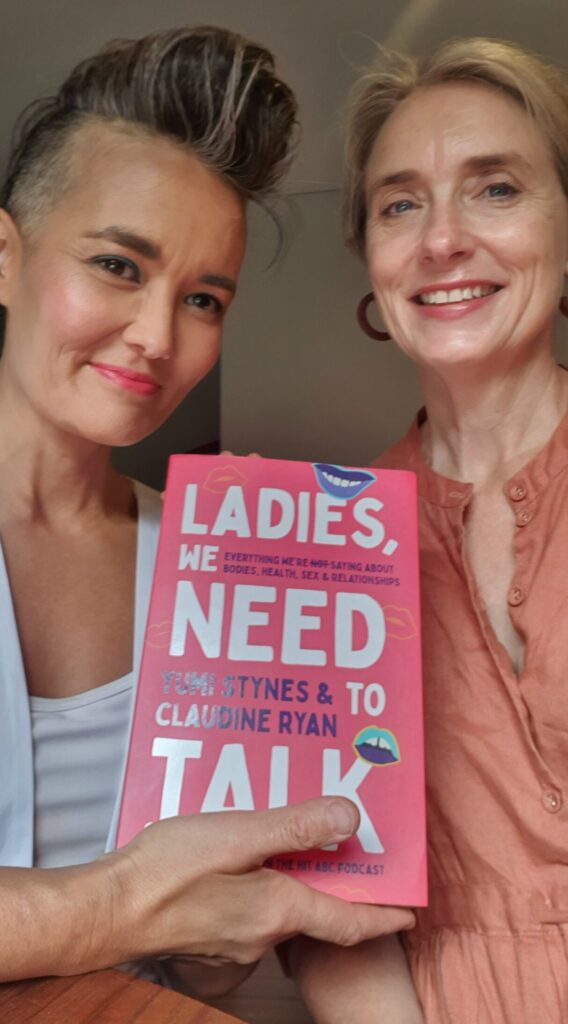‘Ladies, We Need To Talk’ (the book) breaks the stigma around everything women are thinking but not saying. Author and presenter Yumi Stynes and health reporter and digital editor Claudine Ryan cover all the trickiest taboo topics from their hit podcast of the same name…from bodies and mental health to sex and relationships.
In this Q and A BroadAgenda’s editor, Ginger Gorman, asks Yumi few pithy questions about what readers can expect.
The book ‘Ladies, We Need to Talk’ is based on your hit podcast of the same name. Let’s go back to the start. Why and how did it begin?
It started more than 5 years ago when Claudine Ryan, who is an experienced health journalist and very dearly loved boss lady at the ABC, wanted to pitch a podcast to the powers that be at the ABC. She needed a host who was a little bit out-of-the-mould for ABC. She reached out to me and we hit it off immediately.
Why DON’T we talk about things like ageing vulva, female incontinence and clitoral orgasms?
There are lots of reasons – but the biggest one is shame! We’re taught from very early on that our bodies are shameful, embarrassing, and “weird” – just for being what they are, which is female bodies! If, for instance, menstrual fluid is so disgusting and shameful that we couldn’t possibly talk openly about it or show it on TV, then how are we going to be able to talk to our doctors and lovers about it? How are we going to robustly seek out the best ways in which we can manage it?
If, for instance, we’re never told that urinary incontinence can be a common side effect of pregnancy and aging, then we’re led to believe that we’re the only ones experiencing it – that we’re defective, broken, and disgusting.
Clitoral orgasms are wonderful things – but to talk about them? That would be to admit that women experience pleasure, and actually quite like it. And that, to some people, is fucking terrifying.
When you look a bit deeper at why we are not talking about these things it comes back to gender inequality, especially in medicine and medical research.
Why is it important to change that?
It’s important to talk about what we go through as people living in these funny bodies because we’re ALL situated on the spectrum of human experience, no matter how goddamn “perfect” we may appear to be from the outside. And all our bodies do weird things sometimes. And our minds. And all our relationships are sometimes whacky and all our behaviour is sometimes the result of trauma, hardship, pain, mistakes and misinformation. Cherishing ourselves, our spirits and bodies through better understanding is a feminist act.
A really tangible example of why it is important to get comfortable talking about our bodies.

Yumi Stynes (left) and Claudine Ryan with their book “Ladies, We Need to Talk.”
Also given that so many topics you cover are taboo, how hard is it to get experts and case studies to speak out?
It’s the easiest thing in the world! It’s a universal desire to help others by sharing knowledge. Once the podcast ‘Ladies, We Need to Talk’ was established back in 2015, people knew it was a safe space. Their stories would be handled with gentleness and respect. Most people who come in to record their stories start by saying, “I wish more people knew this!” They’re ready to unleash. It’s quite a thing to behold.
What was the most surprising thing you’ve learned both making the pod and writing the book?
I loved talking to women about opening up their relationships to polyamory. There’s a lot of science backing up why women get bored of having sex with the same partner year in, year out, and while I like hearing from experts who study this stuff, it was hearing from women whose pussies are literally engorged and practically AFLAME from having hot additional partners and the kind of sex they actually WANT rather than bullshit obligation sex – that really thrilled me and made me think, “Oh my God, I know NOTHING!”
I could just picture it, and their storytelling was so vivid. It made me think that this idea of being loyal to one partner is as flimsy and light as a helium balloon. The women I interviewed let go of their balloons. The balloons floated away. Oh, guess what? You can fu** who you want. No one cares. It’s your body. Do what you want with it. Have the fun you want. Feel the pleasure. Be greedy for it. Those rules? That shame you’re meant to feel? It floated away.
So brilliant. If I were you I’d flick straight to the chapter on polyamory. And also listen to that podcast episode. I spoke with different people for the book than for the podcast. As soon as I put a call out for polys – among my own friendship group – my phone started pinging. It’s mainstream, but invisible to a lot of us. I mean, I’m exhausted just thinking about it, but also swollen with admiration.
This book as adamantly feminist and refreshingly focuses a lot on choice – and thinking things through from many angles. Why did you write like this?
We’re all products of the society we live in, and it’s enlightening to question if we’re doing certain things because we want to – or because we’re expected to? Our culture isn’t all awful – but there’s a lot of expectation that sets women up to bear the brunt of bullshit – working for less pay, having to spend more time and money looking “pretty”, putting up with bad sex, taking on unpaid caring roles – because why? Because that’s just how it is.
Questioning how it is snatches the power back into our hands.
A classic example is the expectation that we all want kids. What if we don’t? Like, what if we actually choose not to have children? People love to give women the “choice” to have or not have kids, so long as they eventually choose to have kids! If they actively choose to remain childless, it’s a revolutionary act.
You’ve deliberately made the book super accessible. Tell me about your motivations for that.
I’m the daughter of a migrant. I’m always checking in to make sure that what I am saying would make as much sense to someone who speaks English as a second language as it would to a Aussie-born university professor. You don’t win prizes for being an incomprehensible wanker. I’ve been a broadcaster on TV, radio and now podcasts for more than 20 years, and the guiding principle of what I do is to make sense and be understood and hopefully bring some clarity, new information or enlightenment to the listener. I save being a clever bit** for my friends! Ha ha.
- Ladies, We Need To Talk is out now.
Ginger Gorman is a fearless and multi award-winning social justice journalist and feminist. Ginger’s bestselling book, Troll Hunting,came out in 2019. Since then, she’s been in demand both nationally and globally as an expert on cyberhate and the real-life harm predator trolling can do. She's also the editor of BroadAgenda and gender editor at HerCanberra. Ginger hosts the popular "Seriously Social" podcast for the Academy of the Social Sciences in Australia. Follow her on Twitter.





